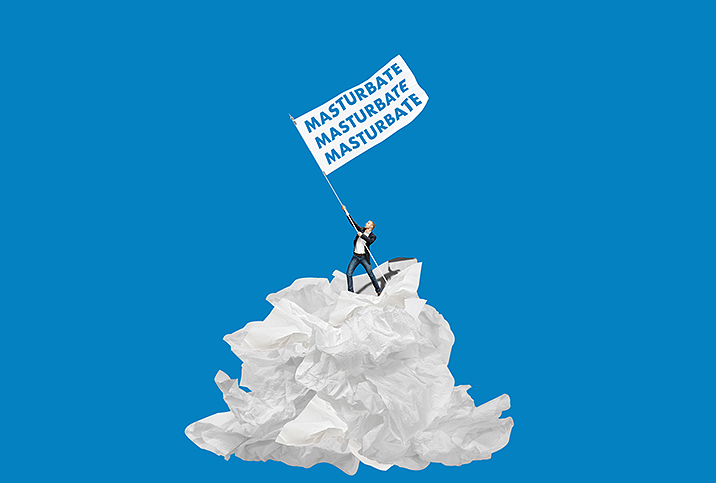The Ever-Relevant Origins of ‘Masturbation Month’

In 1995, San Francisco-based sex shop Good Vibrations, which now has almost a dozen branches nationwide, declared May "National Masturbation Month." The reasoning behind the announcement, which has since blossomed into a global, sex-positive movement, was primarily to amplify the brand ethos of pleasure-focused, guilt-free sex. The trigger came months earlier in the form of a political scandal—Good Vibrations launched ‘Masturbation May’ primarily for alliteration reasons—which led to then-Surgeon General Joycelyn Elders being fired in December 1994.
Elders' crime was daring to suggest children should “perhaps be taught'' about masturbation, an offhand comment made during an AIDS Forum. Soon afterward, she was unceremoniously dismissed, with President Bill Clinton citing “differences with administration policy and my own convictions.”
Despite mounting controversy, Elders later defended her comment in an interview recorded for the National Visionary Leadership Project’s Oral History Archive. “Masturbation never made anybody go crazy, it’s never given anyone a disease or gotten anybody pregnant, and you know you’re having sex with someone you love,” she quipped. Brushing off the notion that anyone needs to be "taught." Elders continued: “God taught us how to masturbate—80 percent of women and 95 percent of men masturbate, the rest lie.”
Even today, Elders’ statement would still be controversial in many parts of the U.S. Research published in The American Journal of Public Health assessed sex-ed programs across the country, and found they often “overlook key aspects of young people’s current and future sexual lives,” including “the fact that sex should be pleasurable.” California has approved guidance encouraging teachers to talk openly about masturbation, yet even these non-binding guidelines were met with outrage.
As cultural stigma has persisted, so has National Masturbation Month. “All kinds of sexual discussion have come up from underground since the mid-1990s, including talk of solo sex,” explained Carol Queen, Ph.D., Good Vibrations’s staff sexologist and co-founder of the Center for Sex and Culture (CSC), an education-based non-profit organization launched in 1994. “Yet, at least in the U.S., there is still such a conservative backlash about being frank with youth and kids. The work goes on.”
Sex-positive advocates have accelerated their efforts over the decades. In 1999, Good Vibrations teamed with national sex toy chain Babeland for the first live Masturbate-a-Thon, held at the CSC. The premise was simple: Gather a room of like-minded, horny strangers and get them to masturbate in exchange for charity donations. The idea has snowballed worldwide, spawning replicas in China, Canada and the United Kingdom, to name a few countries.
'God taught us how to masturbate—80 percent of women and 95 percent of men masturbate, the rest lie.'
In 2011, queer porn film-maker Courtney Trouble received the rare honor of being allowed to film an event in San Francisco, which differed slightly from the usual blueprint—instead of guests masturbating, they were invited to watch porn stars have sex on stage. Trouble speaks highly of the experience. “These events normalize an act some have been taught is a shameful sin,” they said. “People cry, sob and wail with the joy of being a fully sexual human—perhaps for the first time. I’ve seen people have epiphanies and breakthroughs at the Masturbate-A-Thon. It’s a very special event, the kind that will change your life if you take it seriously.”
Research has long indicated the benefits of masturbation. For a 2011 study published in Archives of Sexual Behavior, Christine Elizabeth Kaestle, Ph.D., interviewed 72 college students about their sexual development. Many reported an "ideological conflict" around masturbation fueled by social stigma, but those who "worked through" this reported benefits including relaxation, a decrease in risky sexual behavior, improved body image and an increased understanding of healthy, communicative relationships.
Queen noted other positive outcomes, such as pain relief. “It’s a relatively sure-fire way to orgasm and is super-safe sex—unless your style is inherently risky. Lay off the sandpaper,” she joked. Studies have also shown masturbation can have a positive impact on mental health.
Each year, these positive messages trickle onto social media timelines as acolytes of National Masturbation Month—now truly international—continue to spread the word. The battle to mandate inclusive sex education across the country is ongoing, but Queen argued the impact of censorship goes deeper than school curricula. “Suppressing and shaming masturbation sends a terrible, anti-sexual message that can harm people on a lifelong level if they don’t get the right help and support,” she concluded. “It’s as important now as it ever was to break the spell of shame and silence.”


















